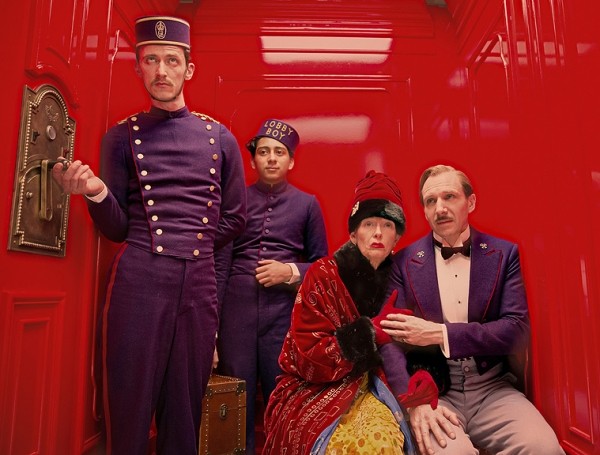
- The Grand Budapest Hotel
As fascinating—and maddening—as it can be watching the arguments that emerge between the fans and detractors of a given filmmaker, it can be almost more fascinating watching fans argue among themselves. For every Quentin Tarantino devotee who enjoys his films simply for the mashed-up genre enthusiasm and crackling dialogue, there’s one who insists he’s doing a lot more—exploring redemption in Pulp Fiction, or notions of masculinity in Death Proof. It can be hard to sell the idea that something brimming with superficial pleasures isn’t just about its superficial pleasures.
Wes Anderson has had me fighting that battle for years, as I’ve tried to argue for the melancholy learning of life lessons beneath his whimsical, meticulously constructed surfaces. But while it feels like there’s something going on in The Grand Budapest Hotel besides its elaborate caper framework—and that Anderson really wants to convey that something—I’ll be damned if I’m ready to figure out exactly what that something is.
He begins with a narrative structure in which the central story isn’t merely a flashback, but a flashback nesting in a flashback nesting inside another flashback, like a matryoshka doll of chronology. A woman visits a memorial for a writer; that writer (Tom Wilkinson), circa 1985, describes his encounter as a young man (Jude Law) in 1968 with Mr. Zero Moustafa (F. Murray Abraham), owner of the once-glorious Grand Budapest Hotel in the “former republic of Zubowka.” And Mr. Moustafa in turn relates his experiences as young protégé (Tony Revolori) of the Grand Budapest’s veteran concierge, Monsieur Gustave (Ralph Fiennes), in 1932.
The plot gets even thicker from there, as Gustave—a people-pleaser whose pleasing includes plenty of rich older women—learns that he has inherited a valuable painting from the late Mme D. (Tilda Swinton), much to the consternation of her son (Adrien Brody) and other heirs. So if they can frame Gustave for the murder of Mme. D., and in so doing strip him of his inheritance … well, that’s just how the game is played.
And it does start to feel like a wonderful game—albeit an uncharacteristically violent one for a Wes Anderson film. The cutaway dollhouse compositions that have become such an Anderson trademark are still here in plentiful supply, adding a certain geography to the elaborate set pieces like Gustave’s attempted escape from prison with a group of hardened criminals (led by Harvey Keitel) and Gustave’s subsequent multi-step secret rendezvous with a man who might be able to clear his name. Those who have found the almost diorama-like quality of Anderson’s mise-en-scene frustratingly constricted aren’t likely to change their minds this time; those who delight in immersing themselves in his oddball universe are going to find plenty of terrific visual gags and wonderfully offbeat character exchanges.
Yet for all its charms—like Fiennes’ exuberant performance and the sheer momentum of Anderson’s storytelling—there’s still that sense that Grand Budapest Hotel is reaching for … well, something, without quite reaching it. The film’s third act involves the coming of war to Europe, but it’s a peculiarly Wes Anderson-esque version of 1930s European war, with a mythical country occupied by a mythical army represented by a double-Z insignia that’s clearly meant to evoke Nazi Germany without every explicitly identifying it. Anderson at times seems to be lamenting the death of a certain kind of Old World European chivalry, but there’s a fuzziness to the subtext that feels awfully risky—because if you’re gonna invoke Nazis in your story, you probably should make it clear that you have a really good reason for doing so.
Perhaps that merely makes The Grand Budapest Hotel exactly what some Anderson fans have considered his other movies: charming feats of filmmaking architecture with several laugh-out-loud moments sprinkled throughout their sometimes farcical action. Or perhaps it’s going to require a second viewing to peel back the layers of its narrative and figure out what Anderson’s trying to say about nostalgia, or the value of art, or the significance of basic decency. That’s perhaps what makes Anderson a particularly easy filmmaker for his fans to love: Even if there’s nothing deeper than what’s right there in front of you, there’s still a reason to believe the anti-Anderson contingent is missing something.
THE GRAND BUDAPEST HOTEL
![]()
Ralph Fiennes, Tony Revolori, Adrien Brody
Rated R
Twitter: @ScottRenshaw